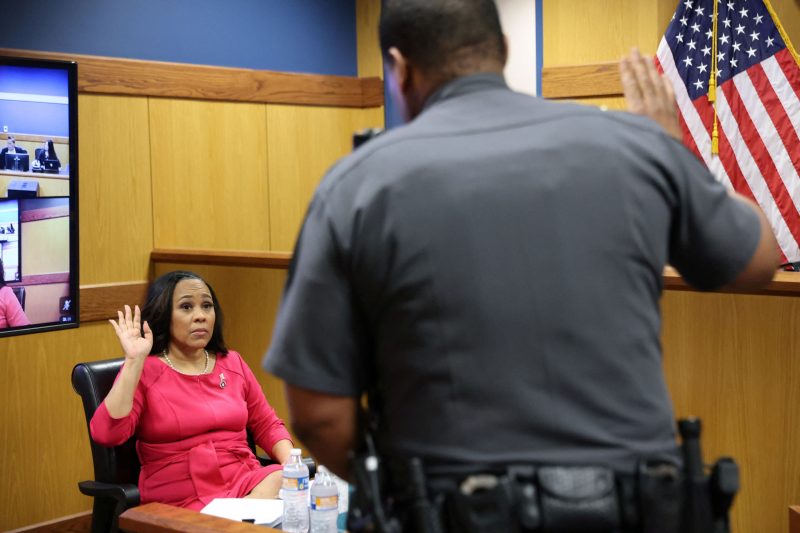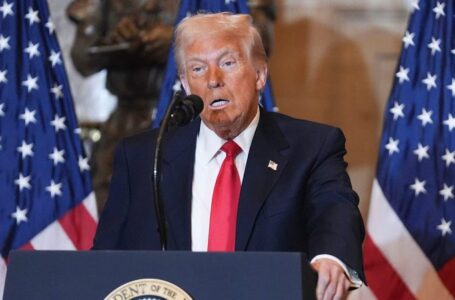Russian missiles rained down on Ukraine just ahead of Treasury Secretary Scott Bessent’s visit
A significant setback for Fani Willis


Donald Trump’s allies have failed in their effort to get Fulton County, Ga., District Attorney Fani T. Willis removed from prosecuting her election subversion case against Trump and others.
But amid their concerted campaign to target prosecutors, they have succeeded in damaging her in a way that could reverberate — with a very significant assist from Willis herself.
And to some legal experts, the judge’s decision raises significant questions about the wisdom of Willis pressing forward, even though she can.
Fulton County Superior Court Judge Scott McAfee ruled Friday that either Willis (D) and her office or special prosecutor Nathan Wade must leave the case. The dispute centered on a previously undisclosed romantic relationship between Willis and Wade, whom she appointed in late 2021, and whether Willis improperly benefited from it.
McAfee found that the Trump-allied defendants hadn’t proved there was a conflict of interest but that the situation carried the “appearance of impropriety.”
The easy call, of course, is for Wade to step aside to allow Willis and her office to press forward. But that might not be the end of the matter, politically or otherwise.
While McAfee’s decision is, in its broad strokes, a win for Willis, it comes with all kinds of tough language about her conduct. It also raises questions about how the matter might linger in the months to come and color views of the prosecution:
McAfee wrote that while the conflict of interest wasn’t proved, “an odor of mendacity remains.”He said that there are “reasonable questions” about whether Willis and Wade “testified untruthfully” about when their relationship began. (That timing was a crux of the complaint, with the defendants trying to prove that the relationship began before Wade was appointed.)McAfee emphasized that his proceedings couldn’t “ferret out every instance of potential dishonesty from each witness” because of constraints.But he suggestively pointed to other forums that could shed more light, including the state bar, a state ethics commission and the Georgia General Assembly. (As it happens, the legislature passed a law, signed by Gov. Brian Kemp (R) this week, empowering a panel to investigate and potentially punish “rogue” local prosecutors. While the law is not explicitly targeted at Willis, the ruling could provide fodder for such a process.)McAfee said Willis had displayed a “tremendous lapse in judgment” and cited “the unprofessional manner” of her animated, defiant testimony last month. He also called a speech she delivered decrying the attacks on her “legally improper” because it suggested racial motivations.
That last bullet point is a particularly stinging rebuke from the judge, who once counted Willis as his supervisor.
And notably, it comes after Willis was scolded by another judge in 2022 in similar terms. Willis had held a fundraiser for a Democratic candidate who would ultimately face one of the Trump allies she was scrutinizing. “It’s a ‘What are you thinking?’ moment,” that judge said in blocking Willis from investigating the man, now-Lt. Gov. Burt Jones (R). “The optics are horrific.”
The optics again loom large — as do other processes that could further damage the case both legally and in the court of public opinion.
“For the good of the case, given that ethics issues will abound now as to Willis, she should voluntarily recuse herself from the case and allow another prosecutor to oversee” it, Andrew Weissmann, the former lead prosecutor in special counsel Robert S. Mueller III’s investigation into ties between then-President Trump and Russia, said on X.
Georgia State University law professor Clark Cunningham, who previously urged Willis to step aside, said the ruling showed why.
He said the matter raised “a risk of reversal of an eventual guilty verdict, especially if the court of appeals disagrees with McAfee.”
One potential avenue for defendants is pointing to Willis’s speech potentially prejudicing jurors. McAfee noted there wasn’t much case law upon which to base a decision, which could invite an appeals court to weigh in.
Emory University law professor Kamina A. Pinder said the ruling cast a “shadow” over Willis’s career. But Pinder noted that putting someone else on the case might harm the prosecution.
In the near term, the ruling probably means more delays, which would play into Trump’s hands with the election looming and uncertainty about whether he’ll face trial before Election Day in at least three of his four criminal cases. (The fourth is scheduled to begin later this month, but the prosecutor on Thursday opened the door to a delay.)
If Willis’s office doesn’t want to try the case itself, she would be faced with finding a new special prosecutor to take it — which could prove difficult given the level of scrutiny faced by Willis and Wade. Any new attorneys would also need to be brought up to speed. And the ruling could be appealed.
There’s also the matter of how feasible it would be for Willis to step aside. McAfee indicated that even a finding of a conflict of interest wouldn’t necessarily disqualify Willis’s entire office. Some suggest that would allow her to hand the case off to a deputy. But it’s murky whether she could do that.
Practical concerns aside, experts largely agreed that Willis had done damage to her cause — that even if her conduct didn’t rise to the level of a conflict of interest, and even if she can continue, she played into the hands of her critics.
“This is a prime example of defense attorneys exploiting an unforced error by a prosecutor,” said Emory law professor John Felipe Acevedo. “It also shows the ability of former president Trump to change the narrative, even in legal proceedings. Willis gave him an opening with this relationship, and his legal team pursued it to the distraction of the main case.”











